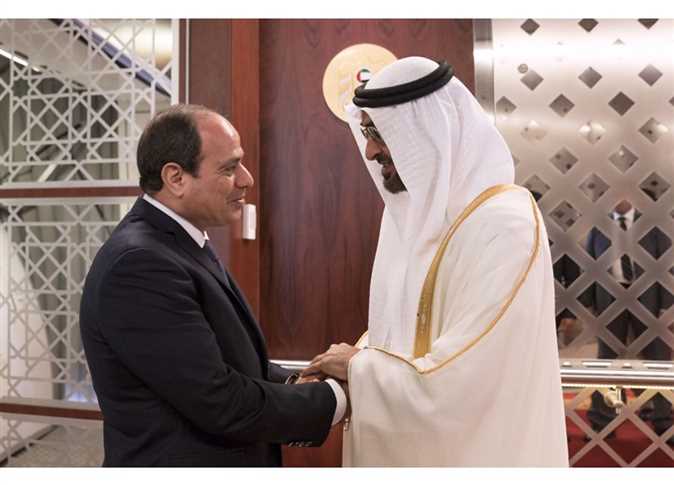Egyptian President Abdel Fattah El-Sisi’s recent two-day visit to Abu Dhabi for talks with Crown Prince Mohammed bin Zayed Al-Nahyan was a testament to the brotherly relations between our two countries and peoples. Our leaders are unfailingly hospitable to guests, but the mutual warmth and respect exuded by El-Sisi and Prince Mohammed was unmistakable.
El-Sisi has characterized the relationship as “special,” and indeed it is. He was visibly touched by the emotionally charged assurances of UAE military official Mohammed bin Salem Kurdous Al-Ameri, who attended the meeting.
“We are with you and we will sacrifice for Egypt. We are implementing the will of the late Emirati leader Sheikh Zayed bin Sultan, and His Highness Sheikh Mohammed bin Zayed, to defend Egypt and sacrifice for it,” Al-Ameri said. El-Sisi, who has repeatedly said threats to the security of Arab Gulf states is “a red line” for him, replied: “We will sacrifice for you too.”
Besides the close ties established under the late Sheikh Zayed, since the destructive Muslim Brotherhood regime was ousted from Cairo in 2013, Egypt and the UAE have formed an ironclad economic, diplomatic and strategic partnership based on shared regional interests and security concerns.
Prominent on the allies’ to-do list are combating terrorism and the malevolent influence of extremist ideologies. Deterring Iran and its new friend Qatar from destabilizing the Arab world, and facilitating political unification in Libya — where division and lawlessness are an invitation to terrorists fleeing Syria and Iraq — are high on their agenda.
When the chips were down, the UAE, Saudi Arabia and Kuwait provided substantial financial support to keep the fragile Egyptian economy afloat while the US, UK and EU turned their backs.
Cairo placed its trust in Emirati economic advisers, and Egypt has benefited from hundreds of projects in the fields of transport, infrastructure, education and health, completed under a UAE development assistance program pledged in 2014.
Today, the UAE’s investments in Egypt exceed $6 billion. A new investment law allowing foreign investors to repatriate profits, convert Egyptian pounds into foreign currencies and benefit from tax-free incentives will encourage even greater direct investment.
Thankfully, Egypt’s economy is no longer in intensive care, its once depleted foreign reserves have risen to a healthy $36 billion, and tourism revenues increased 170 percent in the first seven months of 2017 compared with the same period last year.
Following years of sporadic electricity blackouts, Egypt’s energy requirements will be secured for many years when its supergiant offshore gas field begins production at the end of 2017.
El-Sisi’s economic reforms — the pound’s flotation, decreased subsidies and the imposition of value-added tax (VAT) — are paying off, and have been praised by International Monetary Fund (IMF) and World Bank officials. Inflation is taking a heavy toll on some sectors of society, but there is no gain without pain.
I urge the Egyptian people to exercise patience. El-Sisi is making provisions for the needs of coming generations, amid an expanding population set to reach 128 million by 2030.
Besides the close ties established under the late Sheikh Zayed, the two countries have formed an ironclad economic, diplomatic and strategic partnership based on shared regional interests and security concerns.
Khalaf Ahmad Al-Habtoor
Egypt’s new administrative capital has been criticized in some quarters as being a grandiose waste of money. The critics are wrong. Cairo’s infrastructure is struggling to cope with overcrowding, and parts of the city are brought to a standstill by endless traffic jams. The population needs to be dispersed to ensure a better quality of life for all.
Certain Western powers are not happy that El-Sisi is also shoring up Egypt’s defenses with weapons purchased from diverse countries. A cabal of US lawmakers who pushed for America’s latest suspension of military aid to Egypt allege that he is squandering his treasury’s finances.
Cairo recently purchased four German-made submarines, 50 Russian MIG-29 fighter jets, 24 French-manufactured Rafale combat aircraft and a naval frigate. Naturally, Egypt cannot rely on the US for hardware when the Obama administration froze delivery of paid-for F16s and Apache helicopters.
Should El-Sisi be blamed for strengthening Egypt’s military capabilities when Daesh and affiliated groups are operating out of the Sinai Peninsula and infiltrating the country across its northwest border? Should he be blamed when he has witnessed the tragic fate of Iraq, Syria and Libya, not to mention the fact that Cairo is a guarantor of the territorial integrity of its Gulf allies?
In July, El-Sisi inaugurated the largest military base in the Middle East and Africa, accompanied by Prince Mohammed, Bahrain’s Crown Prince Salman bin Hamad Al-Khalifa, Makkah Gov. Prince Khalid Al-Faisal and Kuwait’s Defense Minister Mohammed Al-Khalid Al-Hamad Al-Sabah.
I commend El-Sisi for his telescopic view in light the region’s multiple challenges, and it is my greatest hope that Egypt, Saudi Arabia, the UAE, Kuwait and Bahrain will forge an impenetrable bloc on all fronts — a single powerful body. Such an entity would have to be constructed with the bricks of trust, and cemented by complete transparency and loyalty. The foundations exist. All that is needed is a leap of faith.
I still remember fondly Egypt’s glory days, when Alexandria rivalled the French Riviera and Cairo was where luxury carmakers and fashion houses launched their new models. That Egypt has disappeared, but if El-Sisi has his way, this country that has stolen a piece of my heart will once again dazzle the world with its brilliance.








































admin in: How the Muslim Brotherhood betrayed Saudi Arabia?
Great article with insight ...
https://www.viagrapascherfr.com/achat-sildenafil-pfizer-tarif/ in: Cross-region cooperation between anti-terrorism agencies needed
Hello there, just became aware of your blog through Google, and found ...